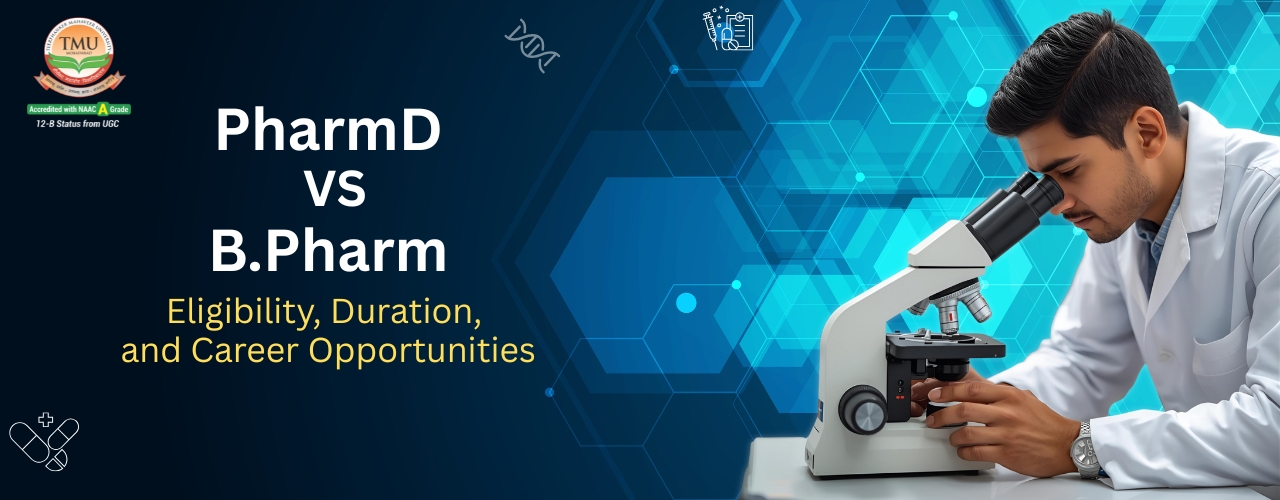PharmD vs. B.Pharm: Eligibility, Duration, and Career Opportunities
Table of Contents
When it comes to building a career in pharmacy, two courses often create confusion among students: PharmD and B.Pharm. Both courses open the door to exciting opportunities in the healthcare and pharmaceutical sectors, but they are quite different in terms of focus, duration, and career paths. Choosing between them is not just about picking a degree; it’s about deciding the direction of your professional journey.
PharmD is more clinically oriented, dealing with patients, prescriptions, and hospital-based roles. On the other hand, B.Pharm focuses on the pharmaceutical industry—covering drug manufacturing, quality assurance, and research. Understanding the key differences between these two programs helps students and parents make an informed choice.
In this article, we’ll break down eligibility, duration, curriculum, skills, and career opportunities for both courses in a simple and easy-to-understand way.
What is PharmD?
PharmD, short for Doctor of Pharmacy, is a professional doctoral degree in pharmacy. Unlike traditional pharmacy courses, which focus mainly on the science and manufacturing of medicines, PharmD emphasises clinical practice and patient care.
In many countries, especially in the US and now increasingly in India, PharmD graduates are recognised as healthcare professionals who work alongside doctors. Their primary role is to ensure patients receive the right medicines, at the right doses, with minimal side effects. They play a crucial role in managing drug interactions, monitoring therapies, and advising patients about their medications.
PharmD is not about working in a lab all day—it is about direct patient care, making it similar to the role of a clinical doctor, but with a focus on medicines.
For students who are passionate about healthcare, enjoy interacting with patients, and want to be part of hospital teams, a PharmD offers a rewarding career path.
Teerthanker Mahaveer University
Apply for Admission
Click Here To Apply for Admission
What is B.Pharm?
B.Pharm, or Bachelor of Pharmacy, is an undergraduate degree in pharmacy. Unlike PharmD, which focuses on clinical pharmacy, B.Pharm is more inclined toward the science and technology of medicine.
Students in B.Pharm learn about drug formulation, manufacturing, quality control, research, and marketing. They become experts in how medicines are made, tested, and delivered to the market. B.Pharm graduates often work in the pharmaceutical industry, regulatory agencies, or research labs rather than in hospitals.
The course also serves as a foundation for those who want to pursue higher studies like M.Pharm, MBA in Pharma Management, or even PharmD (post-baccalaureate).
B.Pharm is the right choice if you are curious about the design, development, and supply of medicines and aspire to work in pharmaceutical companies.
Eligibility Criteria for PharmD
To get into a PharmD program, students need to meet specific eligibility requirements. Here’s a breakdown:
- Academic Requirements
- The candidate must have completed the 10+2 (science stream) with physics, Chemistry, and Biology/Mathematics.
- Minimum mark requirements vary but are usually around 50% aggregate in science subjects.
- Students who already hold a B.Pharm degree can join directly into the PharmD Post Baccalaureate programme, which is shorter in duration.
- Entrance Exams
- In India, some universities conduct their entrance exams.
- In the US and other countries, admission might require tests like PCAT (Pharmacy College Admission Test).
- Additional Conditions
- Students must meet the age requirement (usually a minimum of 17 years) at the time of admission.
- Good communication skills and an interest in patient care are also valuable, though not formally required.
PharmD is more demanding in terms of dedication and clinical involvement, so students must be prepared for hospital rotations, patient interactions, and long training hours.
Eligibility Criteria for B.Pharm
Getting into a B.Pharm programme is generally simpler compared to a PharmD. Let’s look at the requirements:
- Academic Requirements
- Completion of 10+2 (science stream) with Physics, Chemistry, and Biology/Mathematics.
- Minimum 50% aggregate marks in these subjects is typically required.
- Entrance Exams
- Admission is often based on national or state-level entrance exams like NEET, MHT-CET, or university-specific tests.
- Some private colleges also admit students based on merit.
- Other Conditions
- Students must be at least 17 years old at the time of admission.
- No prior degree is needed since it’s an undergraduate program.
B.Pharm offers flexibility for students who want to enter the pharmaceutical sector, pursue higher studies, or even transition into clinical roles by later opting for PharmD Post Baccalaureate.
Duration of PharmD Program
Compared to most undergraduate degrees, the PharmD program is longer because it prepares students for professional, clinical-level responsibilities. Typically, the program lasts six years for students joining after 12th grade. Out of these, five years are dedicated to academic learning and practical training, while the sixth year is a mandatory internship or residency in a hospital setting.
For students entering through the PharmD Post Baccalaureate (after B.Pharm) route, the duration is three years. This includes two years of academic studies plus one year of clinical internship.
The course does not confine students to classroom learning. They spend significant time in hospital wards, outpatient clinics, and speciality departments. This real-world exposure ensures that graduates are ready to handle patients, interact with doctors, and understand the challenges of modern healthcare.
The extended duration can feel like a commitment, but it provides students with an edge by equipping them with both academic knowledge and clinical expertise. By the end of the program, PharmD graduates are confident in clinical pharmacy practices, which sets them apart from traditional pharmacy graduates.
Duration of B.Pharm Program
The Bachelor of Pharmacy (B.Pharm) program typically lasts four years, divided into eight semesters. Unlike PharmD, which requires an internship year, B.Pharm students mainly focus on theoretical learning, laboratory work, and industrial training.
Some universities include a mandatory practical training or industrial internship during the final year, which usually lasts one to six months. This exposure helps students understand how medicines are manufactured, tested, and distributed.
The shorter duration compared to PharmD makes B.Pharm attractive for students who want to enter the workforce earlier. After completing the degree, graduates can either seek employment in pharmaceutical companies or continue with postgraduate studies like M.Pharm, MBA, or PharmD (post-baccalaureate).
B.Pharm is well-structured to cover the science and business aspects of pharmacy, and the four-year timeline makes it easier for students to quickly begin their careers in the industry.
Course Curriculum: PharmD vs. B.Pharm
The curriculum of PharmD and B.Pharm highlights the major difference in focus between the two programs. While both revolve around pharmacy, their orientation is different—PharmD towards clinical care and B.Pharm towards drug science and industry.
PharmD Curriculum
- Human anatomy, physiology, and biochemistry
- Pharmacology and pharmacotherapeutics
- Clinical pharmacy and hospital rotations
- Community pharmacy and patient counselling
- Drug interactions, dosage, and safety monitoring
- Clinical research and evidence-based medicine
PharmD emphasises direct patient care, meaning students learn to prescribe, counsel, and monitor patients just like doctors, but from a medicine-orientated perspective.
B.Pharm Curriculum
- Pharmaceutical chemistry and analysis
- Pharmacognosy (study of medicinal plants)
- Pharmaceutics (drug formulation and delivery systems)
- Pharmaceutical engineering and biotechnology
- Industrial pharmacy and quality control
- Pharmacy law, ethics, and management
B.Pharm focuses more on how medicines are discovered, developed, and supplied. Students spend more time in laboratories, learning about chemical formulations, drug testing, and production methods.
In short:
- PharmD = Hospital + Patients + Clinical Roles
- B.Pharm = Industry + Manufacturing + Research
Skills Developed in PharmD
Studying PharmD helps students build a wide set of clinical and soft skills that prepare them for healthcare roles. These include:
- Clinical Skills – Ability to evaluate prescriptions, monitor patient health, and manage drug therapy.
- Patient Interaction – Communicating with patients, understanding their medical history, and guiding them on correct medicine usage.
- Interdisciplinary Collaboration – Working with doctors, nurses, and other healthcare professionals as part of a hospital team.
- Problem-Solving Abilities – Handling drug interactions, side effects, and emergency medication needs.
- Research and Analysis – Learning how to conduct clinical trials and analyse treatment outcomes.
- Ethical Decision-Making – Ensuring that medicines are prescribed and administered safely and ethically.
These skills make Pharm.D. graduates valuable assets in hospitals, clinics, and even pharmaceutical research organisations. Since the focus is on patients rather than just medicines, the soft skills of communication and empathy are equally important alongside technical expertise.
Skills Developed in B.Pharm
B.Pharm students acquire a different skill set, tailored for the pharmaceutical industry and research. Key skills include:
- Drug Development Knowledge – Understanding how drugs are designed, tested, and brought to market.
- Manufacturing and Quality Control – Ensuring medicines meet industry standards for safety and effectiveness.
- Laboratory and Research Skills – Handling chemicals, equipment, and experimental procedures.
- Regulatory and Legal Understanding – Learning about drug laws, patents, and ethical guidelines.
- Analytical Thinking – Evaluating raw materials, formulations, and finished products.
- Business and Marketing Skills – Knowledge of how pharmaceutical products are marketed and sold.
While PharmD prepares students for hospital-based clinical practice, B.Pharm equips them for roles in pharmaceutical companies, research labs, and regulatory agencies.
Career Opportunities after PharmD
A PharmD degree provides access to careers in the healthcare sector that directly influence patient care. Graduates are recognised as clinical pharmacists, and their expertise is highly valued in hospitals and healthcare organisations. Some of the most common career paths include:
- Clinical Pharmacist in Hospitals
- Work alongside doctors to monitor prescriptions and ensure safe drug administration.
- Participate in hospital rounds and offer advice on the best treatment options.
- Community Pharmacist
- Provide medicines to the public, counsel patients about dosage and side effects, and promote safe medication use.
- Pharmaceutical Care Specialist
- Focus on specialised areas like oncology, cardiology, or paediatrics to provide targeted drug therapy management.
- Academia and Research
- Work as a lecturer in pharmacy colleges or conduct research in clinical trials and patient-based studies.
- Opportunities Abroad
- In countries like the US, Canada, and Australia, PharmD graduates are in demand as licensed clinical pharmacists.
With healthcare becoming more patient-centred, PharmD graduates are positioned as critical members of medical teams, ensuring the right drug reaches the right patient at the right time.
Career Opportunities after B.Pharm
A B.Pharm degree prepares students for careers in the pharmaceutical industry and allied sectors. While the roles are less patient-focused compared to PharmD, they are essential for the functioning of the healthcare system. Common career paths include:
- Pharmaceutical Industry Jobs
- Work in drug manufacturing, quality assurance, regulatory affairs, and research & development.
- Government Sector Opportunities
- Jobs in drug inspector roles, the Food and Drug Administration (FDA), and public health departments.
- Community and Retail Pharmacy
- Similar to PharmD graduates, B.Pharm holders can run or work in pharmacies, though their clinical authority is lower.
- Higher Studies and Research
- Options include M.Pharm (specialisations like pharmaceutics, pharmacology, or pharmacognosy), MBA in Pharma Management, or PharmD (Post Baccalaureate).
- Pharmaceutical Marketing and Sales
- Work as medical representatives or product managers, promoting medicines and interacting with doctors.
B.Pharm is versatile—it gives graduates the option to either enter the workforce early or pursue higher qualifications depending on their career goals.
PharmD vs. B.Pharm Salary Expectations
When it comes to salary, both courses offer good opportunities, but the earnings depend on the chosen career path and location.
PharmD Salaries
- In India, fresh graduates earn around ₹25,000 to ₹45,000 per month in hospitals and clinics.
- With experience and specialisation, this can go up to ₹70,000+ per month.
- Abroad (USA, Canada, Middle East), PharmD graduates earn significantly higher, often ranging between $90,000 to $120,000 annually.
B.Pharm Salaries
- In India, fresh graduates start with ₹20,000 to ₹35,000 per month in pharmaceutical companies.
- With experience, roles in quality control, regulatory affairs, and research can pay ₹50,000+ per month.
- Abroad, B.Pharm salaries vary widely, but opportunities are more industrial and less clinical compared to PharmD.
In summary:
- PharmD salaries are higher in hospital/clinical roles, especially abroad.
- A B.Pharm degree offers stable growth opportunities in pharmaceutical companies and government sectors.
PharmD vs. B.Pharm: Quick Comparison Table
| Aspect | PharmD (Doctor of Pharmacy) | B.Pharm (Bachelor of Pharmacy) |
| Full Form | Doctor of Pharmacy | Bachelor of Pharmacy |
| Level of Study | Professional Doctoral Degree | Undergraduate Degree |
| Eligibility | 10+2 with Physics, Chemistry, Biology/Math (50% marks) OR B.Pharm for Post Baccalaureate entry | 10+2 with Physics, Chemistry, Biology/Math (50% marks) |
| Duration | 6 years (including 1-year internship) / 3 years (post-baccalaureate) | 4 years (8 semesters) |
| Focus Area | Clinical pharmacy, patient care, hospital practice | Pharmaceutical sciences, drug manufacturing, research |
| Internship | Mandatory 1-year hospital internship/residency | Industrial training (3–6 months, depending on college) |
| Core Subjects | Pharmacotherapy, Clinical Pharmacy, Patient Counselling, Clinical Research | Pharmaceutics, Pharmaceutical Chemistry, Pharmacognosy, Pharmacology |
| Skills Developed | Clinical decision-making, patient counselling, and drug therapy management | Drug formulation, manufacturing, quality assurance, and research |
| Career Paths | Clinical Pharmacist, Hospital Pharmacist, Researcher, Academia | Pharmaceutical Industry, Drug Inspector, Research, Pharma Marketing |
| Work Environment | Hospitals, Clinics, Community Pharmacies, Research Institutes | Pharmaceutical Companies, Regulatory Agencies, Research Labs |
| Salary (India) | ₹25,000 – ₹45,000/month initially (can go higher with experience & abroad opportunities) | ₹20,000 – ₹35,000/month initially (growth in the pharma industry and government jobs) |
| Salary (Abroad) | $90,000 – $120,000 annually (USA, Canada, Australia) | $40,000 – $70,000 annually, depending on role & country |
| Best For | Students passionate about healthcare and direct patient interaction | Students interested in pharmaceutical sciences, industry, and research |
| Future Study Options | PhD, Post-Doctoral Research, Specialisations in Clinical Pharmacy | M.Pharm, MBA in Pharma Management, PharmD (Post Baccalaureate) |
Conclusion
PharmD and B.Pharm are two distinct yet equally important programs in pharmacy. While PharmD emphasises patient care, clinical roles, and hospital practice, B.Pharm focuses on the science, production, and business side of medicines.
Both degrees offer excellent career opportunities, but the right choice depends on what excites you more—working with patients in a hospital or working with medicines in a laboratory or company.
No matter which path you choose, pharmacy remains a fast-growing and rewarding field, offering stability, respect, and the chance to make a real difference in people’s lives.
FAQs
Q1. Is PharmD better than B.Pharm?
Ans: Neither is “better.” PharmD is better for clinical and hospital roles, while B.Pharm suits the pharmaceutical industry and research careers.
Q2. Can I do a PharmD after a B.Pharm?
Ans: Yes, you can join the PharmD Post Baccalaureate, which takes only three years instead of six.
Q3. Which course has more job opportunities abroad?
Ans: PharmD offers more opportunities abroad in countries like the US, Canada, and Australia as clinical pharmacists.
Q4. Which course is tougher, PharmD or B.Pharm?
Ans: PharmD is considered tougher because it is longer, more clinically demanding, and involves hospital internships.
Q5. What are the higher study options after B.Pharm and PharmD?
Ans: After B.Pharm, you can pursue M.Pharm, MBA, or PharmD (Post Baccalaureate). After PharmD, you can specialise further with fellowships, a PhD, or post-doctoral research.















